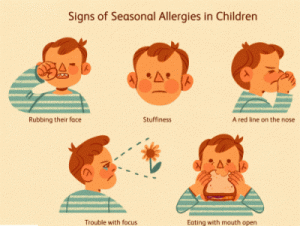What are allergies in children?
Allergies are problems of the immune system. Most allergic reactions happen when the immune system reacts to a “false alarm.” Normally, the human body defends itself against harmful things such as viruses or bacteria. But sometimes the defenses violently attack mostly mild things, such as dust, mold, or pollen.
Normally, allergens are harmless. But when a person has allergies, the body thinks these allergens are harmful. The body then attacks allergens with antibodies called immunoglobulin E (IgE). These antibodies are attached to special cells called mast cells. Allergens stick to the antibodies. This makes the mast cells release histamine and other chemicals causing an allergic reaction. When the chemicals irritate nearby nasal tissue, this causes nasal allergy symptoms. When this happens in the lungs’ breathing tubes, it can cause asthma symptoms such as cough and wheeze. When the reaction involves the whole body, this can be a severe allergic reaction.
What are the symptoms of allergies in a child?
An allergic reaction can happen anywhere in the body. This includes the skin, eyes, lining of the stomach, nose, sinuses, throat, and lungs. These are the places where immune system cells are found to fight off germs that are breathed in, swallowed, or come in contact with the skin. Allergic reactions can cause:
- Stuffy nose, sneezing, itching, or runny nose, and itching in ears or roof of mouth
- Red, itchy, watery eyes
- Red, itchy, dry skin
- Hives or itchy welts
- Itchy rash
- Asthma symptoms, such as shortness of breath, coughing, wheezing
- A severe, life-threatening allergic reaction (anaphylaxis). This can cause trouble breathing, vomiting, diarrhea, low blood pressure, fainting, or death.
What causes allergies in a child?
Many things can trigger allergic reactions. But the most common triggers or allergens are:
- Tree, grass, and weed pollens
- Natural rubber latex
- Molds
- Dust mites
- Animal dander, urine, and oil from skin
- Foods
- Medicines
- Feathers
- Bee stings
- Pests such as cockroaches and mice
Which children are at risk for allergies?
Allergies can affect anyone. It doesn’t matter regardless of age, gender, race, or socioeconomic status. Generally, allergies are more common in children. But allergies can happen at any age. And they can come back after being in remission for many years.
Allergies tend to happen in families. But the exact reason isn’t yet understood. Allergy symptoms often happen slowly over time.

